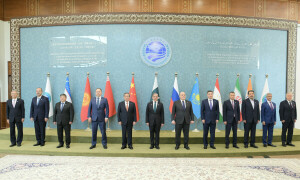Pakistan’s hosting of the 23rd Council of Heads of Government meeting of the Shanghai Cooperation Organization (SCO) was more than just a diplomatic success; It gave the government a chance to show the world that the crises it had faced over the years were under control.
Pakistan has faced a number of challenges over the past few years, including political instability, economic difficulties, and security concerns. These issues have created negative perceptions of the country, which has hurt its diplomatic standing and investor confidence. In light of ongoing internal difficulties, successfully organizing such a complex diplomatic event helped to dispel those impressions.
Due to persistent threats and political unrest, the conference was held under tight security. Despite the fact that the city’s deserted streets during the security lockdown may not have been particularly reassuring for the visiting delegates, they still left with the impression that, in spite of its difficulties, Pakistan remains functional, resilient, and open for business with the rest of the world.
In addition, the conference showed Pakistan as a nation capable of leading initiatives with regional significance in addition to actively participating in global dialogues. In addition, it demonstrated the nation as a trustworthy partner for foreign investors at a time when Islamabad desperately needs foreign investment to revive its economy.
Pakistan’s presidency of the SCO Council of Heads of Government highlighted the country’s role as an active player in regional geopolitics, according to observers. They believe that hosting the summit improved the nation’s diplomatic standing and demonstrated that it was “open for business” with the rest of the world. Pakistan’s growing significance in the organization and the region was emphasized by the presence of eight prime ministers from member nations.
The seriousness of Pakistan’s diplomatic outreach was reinforced by the high-level participation, which indicated that member states regard Pakistan as an essential partner in addressing regional challenges and advancing cooperative efforts.
“Diplomacy is not an event but a process. Dr. Maleeha Lodhi, a former ambassador and columnist, remarked on the significance of Pakistan hosting the SCO summit, “having enhanced its diplomatic standing with member states and demonstrating that Pakistan is an important multilateral player.”
She did, however, warn against exaggerating the significance of hosting the event because the SCO summits rotate in alphabetical order.
The event served to revitalize Pakistan’s bilateral relations in addition to enhancing perceptions of Pakistan and emphasizing its significance in the region.
For instance, despite the fact that Pakistan and China have long been regional allies, particularly in their collaboration on the China-Pakistan Economic Corridor (CPEC), the visit of Chinese Premier Li Qiang to Pakistan marked the first visit by a Chinese prime minister in 11 years.
Premier Li had good reason to leave and send a lower-level representative after the attack on Oct. 6 in Karachi that killed two Chinese workers. However, given that Pakistan is one of the founding members of the SCO, he attended the event and held bilateral talks to reaffirm Beijing’s dedication to Pakistani relations.



